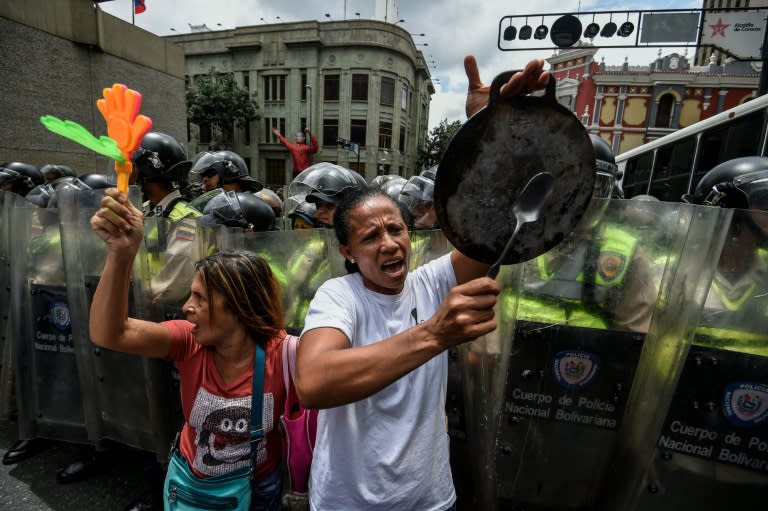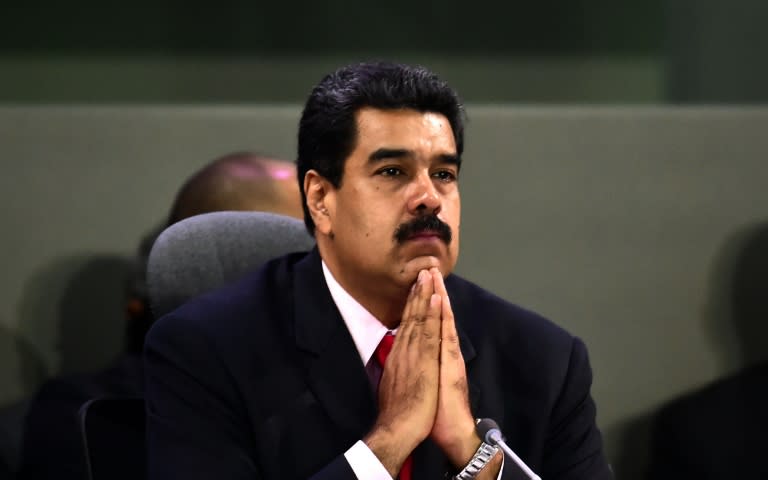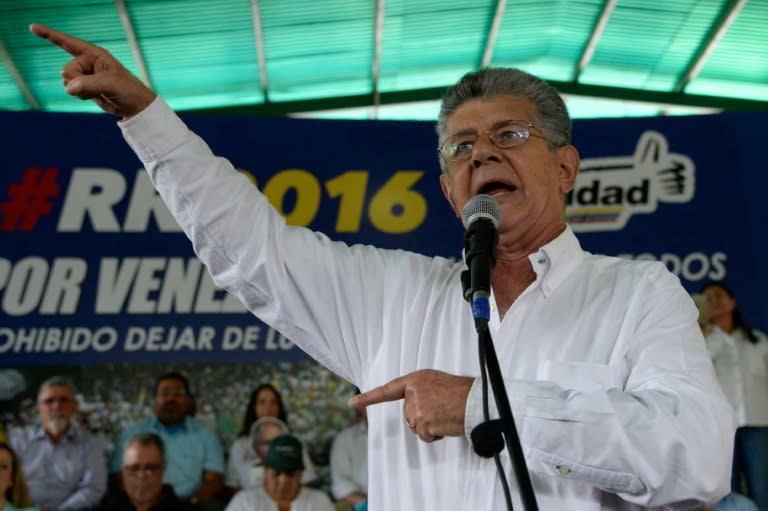100-day countdown ticks in Venezuela political crisis
The next 100 days in Venezuela could mark a turning point in the South American country's seething political crisis, deciding whether the socialist president and his party stay in power. On January 10, 2017, President Nicolas Maduro will have completed four years of his six-year term at the helm of the major oil exporter, whose economy is reeling from sharply lower global crude prices. Saturday begins the 100-day countdown for Maduro's opposition to mount a recall referendum. If the recall vote occurs before January 10 and Maduro is ousted, early elections will be held. But the National Electoral Council (CNE) has announced that, according to the rules, the referendum could only be held in the middle of the first quarter of 2017. If Maduro loses the recall vote post-January 10, he would be replaced by his hand-picked vice president, defeating the opposition's hope to change government. The center-right opposition coalition Democratic Unity Roundtable (MUD) has set a petition drive on October 26-28 aimed at collecting four million signatures, or 20 percent of voters, supporting a recall vote. The coalition insists that the referendum should be held in 2016. Nevertheless the CNE, which the opposition says is beholden to Maduro's government, says there is not enough time left to review the petition signatures and organize the vote this year. With the prospect of holding a referendum in 2016 dim, analysts have projected at least three scenarios in the unfolding crisis. - Recall in 2017 - The MUD wants the petition drive's required 20 percent minimum of support for success to be calculated on a nationwide basis. But the CNE has said the 20 percent threshold will be determined state-by-state. The opposition is "very likely" to muster the required signatures because of the "vision of change" in the country, said Francine Jacome, head of the Venezuelan Institute for Social and Political Studies. According to pollster Venebarometro, seven in 10 Venezuelans want a change in government and 76.4 percent disapprove of the job Maduro is doing. If voters overwhelmingly want a recall vote, "it will be difficult if the authorities don't hold a referendum," economist Luis Vicente Leon, head of the research firm Datanalisis, told AFP. "But they will do it in 2017 and it remains to be seen what the opposition response will be. It would raise tensions," he added. The authorities for now have supported Maduro, because he is at risk of losing "Chavismo," the movement named for Maduro's late predecessor and mentor, the socialist firebrand Hugo Chavez. "The demons will be let loose beginning January 11 when the fighting over the presidential succession begins," said Benigno Alarcon, a political science professor at Andres Bello Catholic University. - Victory in doubt - The opposition is hoping to collect signatures on a national basis, in case it fails to meet the 20 percent minimum in at least one of Venezuela's 24 states. "We are going to see national and international pressure," Jacome said, adding that "the voter participation could be so massive that it forces the CNE to acknowledge the national basis." Leon agreed that tension will rise, because the opposition is trying to force the CNE to accept the referendum and "there will be people there trying to defend their turf." To pressure the electoral body to recognize a 20 percent national level, MUD has called a mass street throughout the country for October 12. "The pressure of the street could yield some changes in the CNE," said Jacome. "What is certain is that they will make the required numbers -- the problem is that in this method the signatures easily can be invalidated," Alarcon said. "And the opposition would be left with no other option than to escalate the conflict." - Signatures miss? - If there is no referendum, the opposition would have to wait for elections in late 2018 and Maduro would finish his term in January 2019. Analysts warn that the CNE's conditions could make a recall difficult: 20 percent threshold in each state; only 5,392 of the machines used in the process -- less than one-third the number MUD was asking for; and time, restricted to seven hours a day. Eugenio Martinez, an elections expert, pointed out that the referendum's postponement to 2017 could discourage some voters from signing because they "know they would be left with the same government" even if Maduro is recalled. But all will depend on how the economic crisis evolves. A significant deterioration in the economy, already beset with inflation and food shortages, could stoke further fury among the public and raise the pressure for Maduro to be pushed out, according to Martinez and Jacome. There is also the possibility that a failure in the petition drive "deflates pressure" and generates "frustration and divisiveness in the opposition," warned Leon. Alarcon pointed out the "lack of a single leader" in the MUD coalition. Although the government is counting on raising its popularity by reducing the severe level of food shortages by 2019, analysts see more conflict if there is no recall vote. Jacome warned that in all these scenarios the nation's Supreme Court -- which the opposition calls the government's "law firm" -- could simply annul the process.




